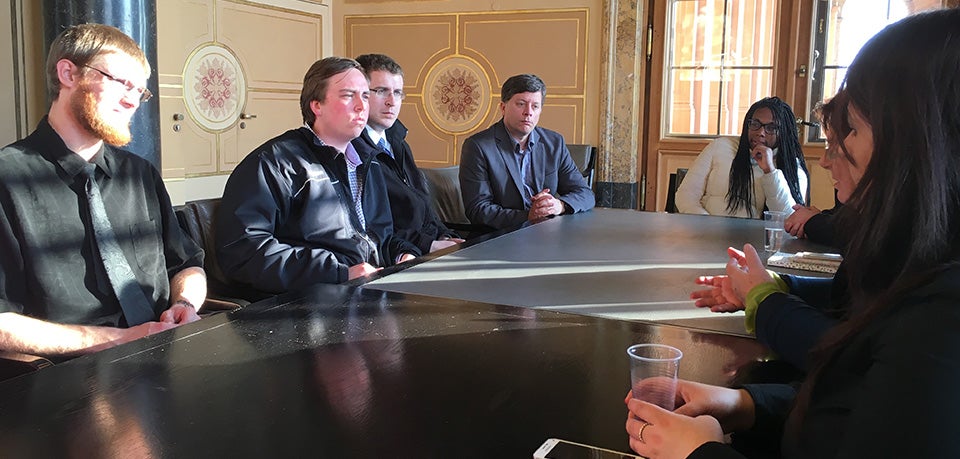PROVIDING DIRECT AID
ECU German Club spends spring break assisting refugee efforts in Germany
Eleven East Carolina University students passed up traditional spring break activities by traveling to Munich, Germany to support local organizations in their humanitarian outreach efforts to refugees and asylum seekers.
In the past year, Germany has absorbed a large influx of displaced refugees from the war-torn areas of Syria, Afghanistan and Iraq.
“We are committed as East Carolina students to live up to our university’s motto ‘to serve’ by providing humanitarian aid to the refugees who have lost their homes, belongings and families,” said ECU German Club President Anthony Razov. “The German Club wants to make a positive difference in the world.”
Dr. David Smith, ECU associate professor of German in the College of Arts and Sciences’ Department of Foreign Languages and Literatures, led the group during their weeklong trip March 4-13.
“The trip was a tremendous success,” said Smith. “We were able to provide direct aid to the refugees for items they desperately need. They were deeply impressed by the fact that we traveled from the U.S. to Germany solely to work with them.”
Under the guidance of Helferkreis Waldperlach, the local aid organization responsible for the refugees’ well-being, ECU students met and advised 150 adult refugees from Afghanistan and Iraq on topics relevant to their new life in Munich. They helped guide refugees on how to use public transportation, shop for necessities and speak basic German. The students also organized free-time activities, and helped provide clothing, food and books from donations raised on a GoFundMe account that was established before the trip.
Razov was hesitant at first because he had seen reports in the British and German media about sexual assaults, harassment and asylum-seeking men banned from public swimming pools in a couple of German towns.
“The media painted an image of the refugees in my head as being violent and unruly,” said Razov. “However, during the first day of volunteering, all the prejudices disappeared because I realized that the refugees are people in need and want help. Now, I am so honored to have had the chance to help the refugees.”
Paige Vaughan, vice president of the ECU German Club, was unsure of what to expect too.
“I was extremely nervous, because I wasn’t sure how the refugees would feel about a group of Americans working with them,” said Vaughan. “I was pleasantly surprised about 10 minutes into our first day. I loved how friendly everyone was, whether it was the volunteers or the refugees. I didn’t feel like an outsider from America.”
Vaughan described the refugees as everyday people she would see on campus or in Greenville – teachers, doctors, athletes and police officers.
“Despite what they were dealing with at the moment, each man there was a normal person like me or my peers. It’s one thing to read about refugees in the newspaper, but when you see a person in the flesh, when you see their emotions expressed on their faces or hear the sound of their voices, it doesn’t even begin to compare to the media representations,” said Vaughan.
The ECU German Club made headlines of its own while volunteering. Many Germans read about the ECU students in the south German newspaper, Süddeutsche Zeitung, which ran a story highlighting the club’s work.
Later in the week, students had the opportunity to meet with Christine Kamm, a local representative in the Bavarian state parliament who is responsible for matters related to the refugee crisis. The students learned about the refugee crisis from a new perspective and shared their ideas on the issues, including how the crisis is depicted in U.S. media.
“Ms. Kamm was able to comment on the refugee crisis in Germany within its political context,” said Smith. “She also gave students insights into how U.S. foreign policy has been viewed over the last decade or so, especially as it pertains to the current refugee crisis.”
Though the ECU students only spent a week in Germany, they learned a lot about themselves and the ongoing needs of the refugees’ plight. Students and faculty are talking about how the ECU German Club may maintain a connection with the volunteers they worked with in Germany.
“I think the students and I were reminded that society only improves when people are willing to come together and address common issues and concerns, regardless of nationality, ethnicity or religious differences,” said Smith. “Service often requires courage – a courage to step outside of one’s own comfort zones and to challenge one’s own preconceived ideas. Our students did just that, and I am immensely proud of them for it and their work to help others.”
The German Club will host a student-led roundtable discussion about the trip from 6:15–7:30 p.m. Tuesday, March 29 in Room 244 in Mendenhall Student Center.

L to R: ECU students Jeffrey Mullins, Bennett Yeargan, Anthony Razov, Associate Professor David Smith and student Kestra James listen as Bavarian state parliament member Christine Kamm answers a question regarding Germany’s response to the refugee crisis while Vaniessa Rashid, representative for integration in Perlach (Munich) and Kamm’s assistant, looks on.